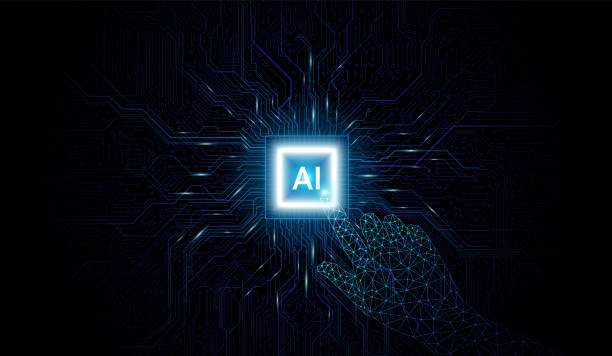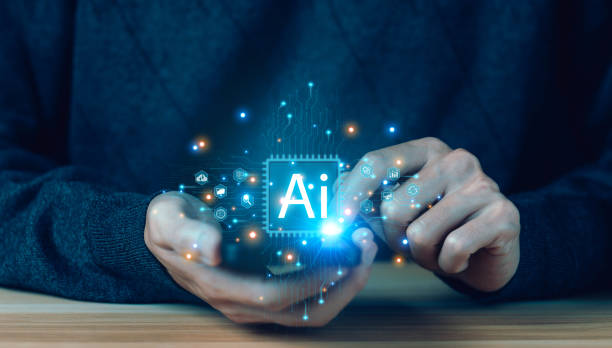What is Artificial Intelligence? Definitions and Basic Concepts
Artificial intelligence (#AI) is a branch of computer science that deals with building machines capable of performing tasks that usually require human intelligence.
These tasks include learning, problem-solving, decision-making, understanding natural language, and pattern recognition.
Machine learning, deep learning, and natural language processing (NLP) are important sub-branches of artificial intelligence.
The main goal of artificial intelligence is to create systems that can think and act independently.
For example, an AI system can identify patterns by analyzing data and make predictions or decisions based on them.
These systems can be used in various fields such as medicine, engineering, finance, and education.
Artificial intelligence has been able to penetrate various aspects of our lives and help improve and facilitate many processes.
Are you tired of your online store not generating as much revenue as its potential suggests? Rasaweb, a specialist in designing professional online stores, will solve this problem forever!
✅ Increase sales and revenue
✅ High loading speed and excellent user experience
⚡ Get free consulting for online store design
History and Evolution of Artificial Intelligence
The history of artificial intelligence dates back to the 1950s, when researchers began exploring the possibility of building machines capable of thinking.
Alan Turing, one of the pioneers in this field, presented the Turing test, a criterion for measuring the intelligence of machines.
In the following decades, significant progress was made in various fields of artificial intelligence such as problem-solving, expert systems, and machine learning.
However, artificial intelligence has faced periods of stagnation and progress.
In recent years, with the increasing processing power of computers and access to large data, we have witnessed significant advances in deep learning and neural networks.
These advances have led to the widespread application of artificial intelligence in various fields.
Today, artificial intelligence plays an important role not only in scientific research but also in our daily lives.
Click here to preview your posts with PRO themes ››
Applications of Artificial Intelligence in Various Industries
Artificial intelligence has extensive applications in various industries.
In the field of healthcare, artificial intelligence can help in diagnosing diseases, developing new drugs, and providing personalized care to patients.
In the financial industry, artificial intelligence can be used to detect fraud, manage risk, and provide financial services to customers.
In manufacturing, artificial intelligence can help optimize production processes, control quality, and predict equipment failure.
In the transportation industry, artificial intelligence can be used to develop self-driving cars, optimize transportation routes, and manage traffic.
Artificial intelligence also has important applications in education, entertainment, and many other fields.
| Industry | Application of Artificial Intelligence |
|---|---|
| Healthcare | Disease diagnosis, drug development |
| Finance | Fraud detection, risk management |
| Manufacturing | Process optimization, quality control |
Machine Learning and Its Role in Artificial Intelligence
Machine learning is one of the most important sub-branches of artificial intelligence that allows machines to learn from data without explicit programming.
In machine learning, algorithms use training data to identify patterns and relationships in the data and create models based on them.
These models can be used for prediction, classification, and decision-making.
There are different types of machine learning algorithms, including supervised learning, unsupervised learning, and reinforcement learning.
Machine learning plays a key role in many artificial intelligence applications, including image recognition, natural language processing, and recommender systems.
Recent advances in deep learning, which is a type of machine learning, have led to significant improvements in the performance of artificial intelligence systems.
Do you dream of a thriving online store but don’t know where to start?
Rasaweb is your comprehensive online store design solution.
✅ Attractive and user-friendly design
✅ Increased sales and revenue⚡ Get free consultation
Natural Language Processing and Human Language Understanding by Machines
Natural Language Processing (NLP) is a branch of artificial intelligence that allows machines to understand and generate human language.
NLP includes a set of techniques and algorithms that are used to analyze, interpret, and generate text and speech.
NLP applications include machine translation, text summarization, sentiment analysis, chatbots, and virtual assistants.
Using NLP, machines can answer questions, extract information from text, and interact with humans in natural language.
Recent advances in deep learning have led to significant improvements in the performance of NLP systems.
Artificial intelligence has brought many transformations in this field.
Neural Networks and Deep Learning
Neural networks are computational models that are inspired by the structure of the human brain.
These networks are composed of a large number of nodes (neurons) that are connected in a layered fashion.
Each node receives an input, processes it, and produces an output.
Deep learning is a type of machine learning that uses neural networks with multiple layers.
Deep neural networks are capable of learning complex patterns from data and perform very well in many artificial intelligence applications such as image recognition, natural language processing, and speech recognition.
Recent advances in hardware and algorithms have led to the development of larger and more complex deep neural networks.
Challenges and Limitations of Artificial Intelligence
Despite significant advances, artificial intelligence still faces challenges and limitations.
One of the main challenges is the need for large and high-quality data to train artificial intelligence models.
Another challenge is the interpretability of artificial intelligence models, especially in the case of deep neural networks, which are difficult to understand how they make decisions.
Also, ethical issues related to the use of artificial intelligence, such as discrimination and privacy, have raised concerns.
Other limitations include vulnerability to adversarial attacks, inability to generalize to new situations, and the need for significant computational resources.
To overcome these challenges, there is a need for more research and the development of new approaches in artificial intelligence.
| Challenge | Description |
|---|---|
| Data Requirement | Need for large and high-quality data |
| Interpretability | Difficulty in understanding how decisions are made |
| Ethical Issues | Discrimination and privacy |
What Expectations Can Be Had for the Future of Artificial Intelligence?
The future of artificial intelligence looks very promising.
It is expected that artificial intelligence will play a more important role in our daily lives and help solve many problems.
Further advances in machine learning, natural language processing, and computer vision can lead to the development of artificial intelligence systems that are capable of doing things that we cannot even imagine today.
Self-driving cars, intelligent virtual assistants, and advanced robots are just a few examples of the potential applications of artificial intelligence in the future.
However, to realize this vision, there is a need for more research, investment, and collaboration between researchers, industrialists, and policymakers.
Is your online store ready to attract maximum customers and increase sales? Rasaweb transforms your online business with modern and efficient online store designs.
✅ Increased speed and improved SEO
✅ Excellent user experience on mobile and desktop⚡ Get free online store design consultation from Rasaweb!
The Impact of Artificial Intelligence on the Labor Market and New Job Opportunities
Artificial intelligence will have a significant impact on the labor market.
On the one hand, artificial intelligence can lead to the automation of many jobs and eliminate some jobs.
On the other hand, artificial intelligence can create new job opportunities, especially in areas related to the development, deployment, and maintenance of artificial intelligence systems.
To prepare for these changes, there is a need to retrain the workforce and develop new skills such as data science, machine learning, and programming.
Also, policymakers should consider creating social safety nets to support people who lose their jobs due to automation.
Ethical and Social Considerations of Artificial Intelligence
The use of artificial intelligence comes with important ethical and social considerations.
One of these considerations is discrimination.
If the training data used to train artificial intelligence models is discriminatory, these models can also make discriminatory decisions.
Another consideration is privacy.
Artificial intelligence systems often require a lot of personal data, which can lead to concerns about privacy.
Also, accountability for decisions made by artificial intelligence systems is a challenge.
If an artificial intelligence system makes a wrong decision, who will be responsible? To address these challenges, there is a need to develop ethical principles and guidelines for the use of artificial intelligence and create legal mechanisms to ensure accountability.
Frequently Asked Questions
| Question | Answer |
|---|---|
| What is the definition of Hosh Masnooi (Artificial Intelligence)? | It is a field in computer science that aims to create intelligent machines that can think, learn, solve problems, and make decisions like humans. |
| Mention some common artificial intelligence applications. | Includes self-driving cars, voice assistants (such as Siri and Alexa), recommendation systems (such as Netflix and Amazon), facial recognition, and medical diagnosis. |
| What is the difference between Narrow Artificial Intelligence (ANI) and General Artificial Intelligence (AGI)? | Narrow AI specializes in one specific task, while General AI has the human intellectual ability to perform any cognitive task. |
| What is Machine Learning and its relation to artificial intelligence? | Machine learning is a branch of artificial intelligence that focuses on developing algorithms that allow systems to learn from data without explicit programming. |
| What are Artificial Neural Networks? | These are computational models inspired by the structure and function of the human brain, and are used in deep learning to process data and discover complex patterns. |
| Mention some of the ethical challenges related to artificial intelligence. | Includes privacy issues, bias in data and algorithms, job loss, and responsibility in the event of errors or unfair decisions. |
| What is Natural Language Processing (NLP)? | It is a branch of artificial intelligence that focuses on enabling computers to understand, interpret, and generate human language in a useful and interactive way. |
| How can artificial intelligence affect the labor market? | It can lead to the automation of some routine tasks, requiring retraining of workers and creating new jobs in the fields of designing, developing, and maintaining artificial intelligence systems. |
| What is Computer Vision? | It is a field in artificial intelligence that enables computers to “see,” understand, and interpret images and videos in the same way that humans do, enabling them to recognize objects and faces. |
| What is the importance of data in the development of artificial intelligence systems? | Data is the fuel that feeds artificial intelligence systems, especially in machine learning. The quality and quantity of data significantly affect the accuracy and performance of models and their ability to learn and make correct decisions. |
And other services of Rasa Web Advertising Agency in the field of advertising
Intelligent Data Analysis: A fast and efficient solution to improve SEO ranking with a focus on intelligent data analysis.
Intelligent Reportage: A creative platform to improve website traffic with marketing automation.
Intelligent Reportage: A professional solution for customer acquisition with a focus on precise audience targeting.
Intelligent Reportage: A creative platform to improve customer acquisition with marketing automation.
Intelligent SEO: A novel service to increase website traffic through an SEO-oriented content strategy.
And more than hundreds of other services in the field of internet advertising, advertising consulting, and organizational solutions
Internet Advertising | Advertising Strategy | Reportage Advertising
Resources
Artificial Intelligence in Warehousing and Data Analysis
,Applications of Artificial Intelligence in Iran
,Applications of Artificial Intelligence and its Role in Life Today
,What will the Future of Artificial Intelligence be Like?
? To elevate your business in the digital world and reach the peaks of success, contact “Rasaweb Afarin” today and benefit from our professional services in the field of Multilingual Website Design, SEO, and Digital Marketing.
📍 Tehran, Mirdamad Street, next to the Central Bank, South Kazerun Alley, Ramin Alley, No. 6











